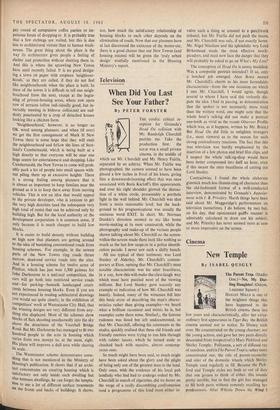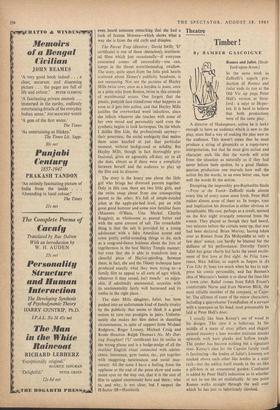Cinema
New Temple
By ISABEL QUIGLY The Parent Trap. (Studio One.)—No, My Dar- ling Daughter! (Odeon, Leicester Square.) HAYLEY MILLS is one of the brightest things that have happened to the British cinema these last few years and characteristically, after her extra- ordinary first appearance in Tiger Bay the British cinema seemed not to notice. So Disney took over. He concentrated on the young charmer, not the young actress, and gave her two parts directly descended from (respectiveh) Mary Pickford and Shirley Temple : Pollyanna, a sort of diffused ray of sunshine, and (in The Parent Tr•ap)a rather more concentrated one, the role of parent-reconciler and oiler of the domestic wheels which Shirley Temple used regularly to fill. Because the Pick- ford and Temple styles are both so out of date that one groans to think of either, this sounds pretty terrible, but in fact the girl has managed to fill both parts without remotely recalling her predecessors. After Whistle Down the Wind I even heard someone remat king that she had a look of Jeanne Moreau—which shows what a way she is from the old curls and dimples.
The Parent Trap (director: David Swift; `I.J' certificate) is one of those shamelessly sentimen- tal films which just occasionally--if everyone concerned comes off successfully—one can, lumps in the throat notwithstanding, swallow. The story, quite apart from the little pink hearts scattered about Disney's publicity handouts, is not reassuring. Nor are the pictures of Hayley Mills twice over, once as a hoyden in jeans, once as a prim miss from Boston, twins in this comedy of matrimonial errors. One forgets that the plastic, puttyish face transforms what happens as soon as it gets into action, and that Hayley Mills justifies the overworked word infectious, since she infects whatever she touches with some of her own mood and personality until even the synthetic begins to look homespun. On the whole I dislike film kids, the professionals anyway— their poseyness, the social ambiguity that makes them seem hatched at just that particular moment, without background or solidity. But Hayley Mills, though in fact thoroughly pro- fessional, gives an agreeably off-duty air to all she does, almost as if there were a complicity between herself and the audience to play up the film and its director.
The story is the hoary one about the little girl who brings her divorced parents together. Only in this case there are two little girls, and the twins swap about from one unsuspecting parent to the other. It's full of simple-minded jokes at the apple-pie-bed level, put on with great good humour and some nice familiar faces (Maureen O'Hara, Una Merkel, Charles Ruggles); as wholesome as peanut butter and with the same amount of salt. The remarkable thing is that the salt is provided by a young adolescent with a fake American accent and some pretty awful-sounding things to do, such as a song-and-dance business about the joys of togetherness in the best Shirley Temple manner; but even that she is able to transform into a cheerful piece of Hayley-spoofing. Between them, in fact, she and the Disney technique have produced exactly what they were trying to—a family film to appeal to all sorts of ages which, whatever it may sound, isn't treacly . an enjoy- able, if admittedly sentimental, occasion with its sentimentality fairly well harnessed and its smiles in the right place.
The elder Mills daughter, Juliet, has been pushed into an unfortunate kind of family rivalry by the publicity that seems to think it a good notion to turn out prodigies in pairs. Unfortu- nately she makes her film debut in daunting circumstances, in spite of support from Michael Redgrave, Roger Livesey, Michael Craig and Renee Houston. Ralph Thomas's No. My Dar- ling Daughter! (`U' certificate) has its smiles in the wrong places and is a hodge-podge of all the murkier English ritual connected with adoles- cence, innocence, gym tunics, etc., put together with staggering tastelessness and social inac- curacy. All the same I have a feeling, from the applause at the end of the press show and some moist eyes on the way out, that it is the sort of film to appeal enormously here and there: who to, and why, is not clear, but I suspect the H-factor (H=Humbert).































 Previous page
Previous page